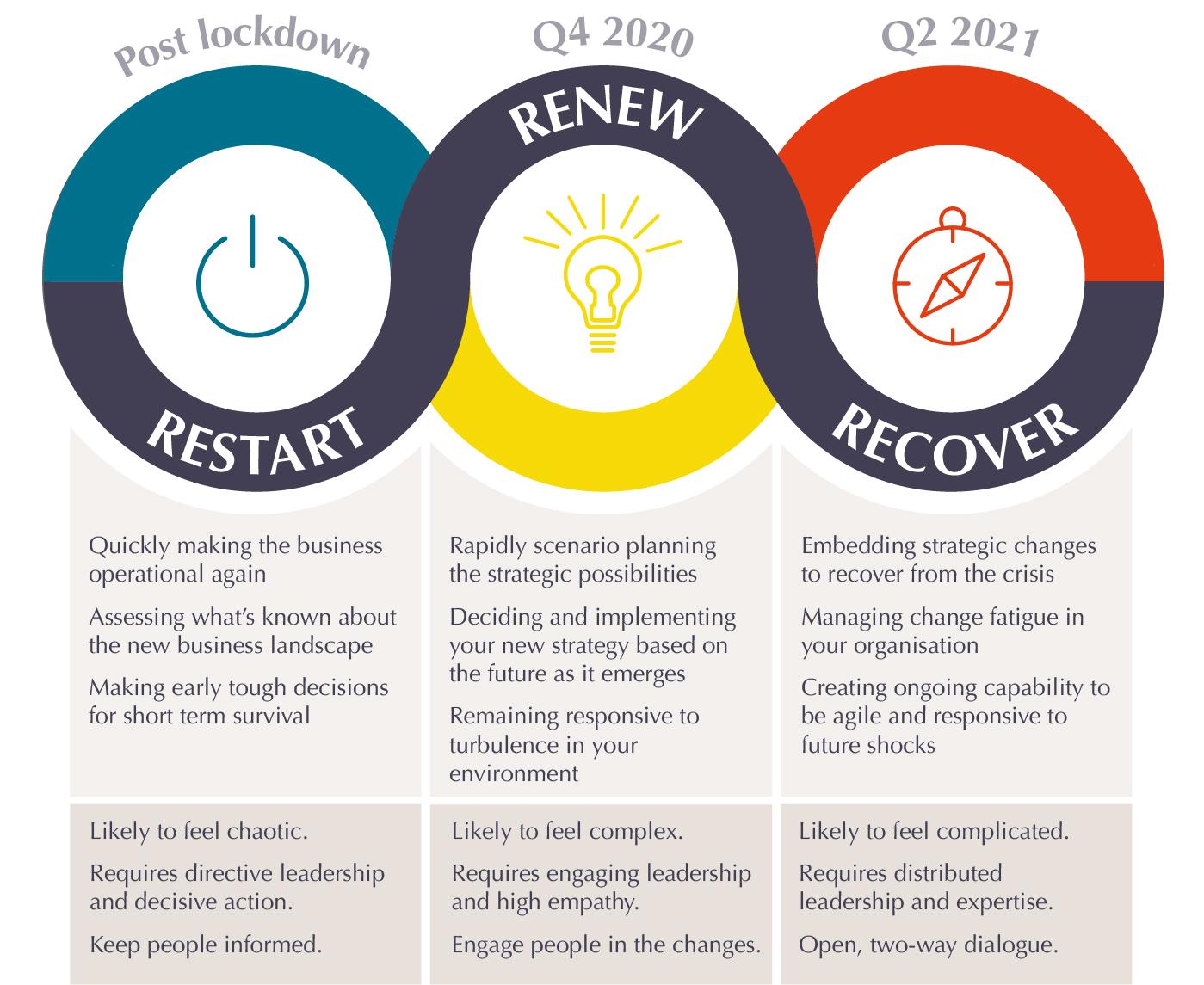
The global Covid-19 pandemic has created unprecedented turbulence and disruption: the world as we knew it has changed. Organisational plans have been wiped out and the ongoing uncertainty makes it difficult for leaders to know how to respond. As yet, it’s not fully known how and when the lockdown will be lifted in the UK. There is deep uncertainty about how the economy will return; the nature and scale of the economic impact; and how the government will continue to react. Will major companies that were previously viable be bailed out? Will the government’s response be an injection into infrastructure to reboot the economy or a resumption of austerity? All of these things are unknown at present. Yet it’s against this backdrop that leaders have to take strategic action.
The 3 stages of adaptation post lockdown
The journey through and out of the Covid-19 crisis will be one of adaptation for businesses over a period of many months. The exact nature of evolution will be unique for each business and each sector, but we can assume it will happen in three distinct phases. The actions focus and leadership in each phase will have to be tailored to what’s required at that time.

Restart
Once the lock-down is lifted, leaders will be focused on restarting their businesses in a changed economy. Initially, this will be about transitioning furloughed employees back into the business and getting teams fully operational. But it will be heavily influenced by policy decisions and how government and others are doing in successfully managing the virus.
Leaders should begin preparing for the restart now. In addition to day-to-day operational considerations, executive leaders will want to take stock of their business and the impact the virus and lockdown measures have had. During this time, leaders will be assessing what’s known about the new business landscape and gathering information to make decisions with the data available. For many, there will be tough decisions to be made to ensure the short-term survival of the business. For some, it may involve reimagining their entire business. What’s needed during this time are the immediate actions that keep a business viable, ensure people are safe and getting essential business functions operational.
The leadership required in the restart phase is directive. It’s a time of great uncertainty and employees may be anxious about being exposed to the virus and the economic consequences of the lockdown. They will be looking for clarity of message and purposeful action – all delivered with sensitivity.
Renew
Once businesses have restarted, they should look to adapt themselves to the new reality. A wait and see approach is not an option. Research after previous major events, whether the dom.com bubble or the global financial crisis, shows that the companies who moved first to understand the implications of the crisis and then took early action performed significantly better than those who waited until there was more certainty before planning what to do next. Any strategic pivot takes time, so the companies that move early gain a strategic advantage over those who decide to wait and see.
Yet there is understandable reticence to make a wrong turn whilst there’s uncertainty about how events will unfold. Not all action is good action. It has to be concentrated in the right area. Data and knowledge usually precede action in business. Companies typically take strategic action once they sufficiently understand the business landscape to assess the viability and risk of their actions. Yet with so much uncertainty and unpredictability, how do business leaders know what approach to take?
It is in this moment that Scenarios become the key strategic tool. By rapidly scenario planning the plausible ways that events could unfold, business leaders can better understand the key variables that may impact their business. This can then inform new strategy. Scenario planning allows leaders to plan for more than one eventuality; enabling them to quickly pivot if they see a particular scenario beginning to happen. This supports the business in remaining responsive to ongoing turbulence in the environment.
During this time there should be coordinated effort to identify the capabilities that need to be strengthened and the structures that allow for organisational agility. As leaders move to renew their organisations, the directive leadership required in the restart phase should give way to a more inclusive and engaging leadership approach. Effectively renewing an organisation is best done when leaders harness all of the institutional knowledge. For example, your frontline people are often alert to early changes in customer/client behaviour. Finding ways to use their tacit knowledge can provide a strategic advantage over competitors whose leaders remained hierarchical and directive.
Recover
There will be a recovery. But even though we don’t yet know when it will happen and what it will look like, (and we can assume it will happen at different times in different sectors) by the time it begins, the most successful organisations will be well prepared. How an individual business recovers will be a consequence of actions previously taken. So being successful in the recovery phase starts now, with what you spend your time doing in the restart and renew phases.
Recovery will be the longest phase, and stamina will be the name of the game. Leaders will need to help their people with change fatigue and adjusting to a new normal. But this can’t just be done by executive leaders. During the recovery phase, leadership should be distributed throughout the organisation as executives rely on the expertise in their teams.
Start thinking about your future now
Whilst we know that there is time before we move into recovery, we believe it is the planning and actions that business leaders take now that will ensure their preparedness for operating in a changed business landscape. Unknown does not have to mean unknowable. Leaders who are aware of the plausible scenarios can consider their company’s position against each one and plan accordingly. And in each stage, as the business adapts and evolves, so must a leaders’ focus and style. People need different things from leaders at different times. By staying alert to this will help leaders provide what’s needed throughout the long road out of the crisis.
By Jacqueline Conway…
Dr Jacqueline Conway works with CEOs and executive teams as they fully step into their collective enterprise-wide leadership, helping them transform their impact and effectiveness.
Jacqueline is Waldencroft’s Managing Director. Based in Edinburgh, she works globally with organisations facing disruption in the new world of work.

